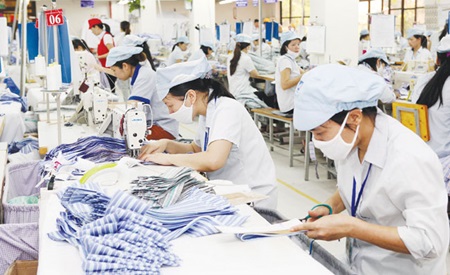
Prime Minister Nguyen Tan Dung has just approved a programme to develop and upgrade industrial clusters and value chains for products with competitive advantages in five sectors.
Prime Minister Nguyen Tan Dung has just approved a programme to develop and upgrade industrial clusters and value chains for products with competitive advantages in five sectors.
The five sectors are: electronics and information technology, textiles; food processing; agricultural machinery; and tourism and related services.
 |
| Workers cut and sow fabric at the No. 2 Textile Factory in Ha Noi . PM Dung has approved a programme to develop and upgrade industrial clusters and value chains for products with competitive advantages in five sectors, including textiles, garments and food processing. |
By the end of 2015, the programme aims to complete the task of identifying and studying potential regions with industrial clusters and products with competitive advantages so that they can be marked for attracting investment and kick-starting pilot projects.
By 2020, it is expected that the pilot projects will be operating in the potential regions with comprehensive mechanisms and policies to attract investment, improve interconnectivity and human resources, and apply scientific and technological advances to improve value chains and industrial cluster models.
Industrial clusters will be developed and upgraded in cities and provinces based on products that the localities enjoy advantages in making. Some examples are: consumer electronics in Binh Duong; visual electronics in Thai Nguyen, Bac Ninh, Bac Giang, Ha Noi and Hai Duong; IT and IT-related services in Ha Noi, HCM City and Da Nang.
Textile industrial clusters will be based in Thai Binh, Nam Dinh, Ninh Binh and Bac Giang while garment clusters will be located in HCM City and the Central region.
The programme will develop seafood processing clusters in the Mekong Delta, and those for seafood and agricultural products along coastal, Central Highland provinces and the Northern midlands.
Agricultural machinery clusters will be developed in Ha Noi, Hai Duong, Hai Phong, HCM City, Long An and Dong Nai.
The country will also establish tourism clusters, like the marine eco-tourism cluster in Hai Phong and Quang Ninh, the sea-resorts and cultural heritages cluster in Da Nang, Hue and Quang Nam, and water-sports, entertainment and rural discovery clusters in Khanh Hoa and Binh Thuan.
Tourism clusters in Binh Dinh, Phu Yen and Ninh Thuan will also lean towards eco-tourism with their well-preserved landscapes, while HCM City and Ba Ria-Vung Tau will focus on developing the services and entertainment industries.
To implement the programme effectively, two sets of solutions have been proposed.
Policy solutions will target attracting investment, applying sci-tech advancements and developing human resources.
The other group of solutions will carry out projects in several areas. Some of these will increase the capacity of sci-tech research institutes, improve connectivity between training facilities and businesses, upgrade logistics networks to improve regional links in production and procurement, and improve processing of rice in Southern region.
(Source;VNS)





